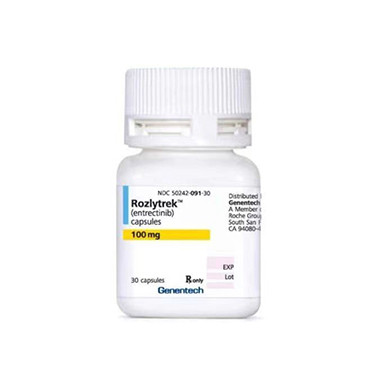What is the effect of Entrectinib on lung adenocarcinoma?

What is the effect of Entrectinib on lung adenocarcinoma?
Entrectinib has a very significant therapeutic effect on lung adenocarcinoma. Clinical trials have shown that Entrectinib can produce good therapeutic effects on patients with lung adenocarcinoma who have acquired ALK, ROS1, and NTRK mutations. These gene mutations are one of the main causes of the occurrence and development of lung adenocarcinoma. Entrectinib can selectively act on these mutant genes, thereby blocking the growth and division of tumor cells and inhibiting the progression of lung adenocarcinoma.
Compared with traditional treatment methods for lung adenocarcinoma, the main advantage of Entrectinib lies in its characteristics of targeting and individualized treatment. Traditional treatment methods such as radiotherapy and chemotherapy have limited therapeutic effects on patients and can cause serious toxic and side effects. As a targeted therapeutic drug, Entrectinib can reduce the damage to normal cells and alleviate the adverse reactions of patients. In addition, Entrectinib can also carry out individualized treatment according to the gene mutations of patients, improving the pertinence and effectiveness of treatment.
Clinical studies have shown that the effective rate of Entrectinib in the treatment of lung adenocarcinoma reaches more than 80%. In early clinical trials, the treatment of patients with ALK-mutated lung adenocarcinoma with Entrectinib showed significant curative effects. The research shows that the tumor volume of lung adenocarcinoma in patients with ALK mutations has significantly decreased, and the time of tumor progression has been significantly prolonged. For patients with lung adenocarcinoma with other mutant genes, such as those with ROS1 and NTRK mutations, Entrectinib can also achieve good therapeutic effects.
In addition to its significant therapeutic effects, Entrectinib also shows good safety. Clinical trials have shown that although patients treated with Entrectinib for lung adenocarcinoma may experience some uncomfortable side effects, they are generally mild and can be controlled by adjusting the drug dosage or providing corresponding supportive treatment. Most patients can tolerate the treatment well and do not have serious adverse reactions.
However, it is worth noting that Entrectinib is not suitable for all patients with lung adenocarcinoma. Only those patients with acquired ALK, ROS1, and NTRK mutations can benefit from Entrectinib treatment. Therefore, before starting treatment, patients need to undergo corresponding gene testing and mutation screening to determine whether they are suitable for individualized treatment with Entrectinib.
In conclusion, as a targeted therapeutic drug, Entrectinib shows good efficacy and safety in the treatment of lung adenocarcinoma. For patients with lung adenocarcinoma who have acquired ALK, ROS1, and NTRK mutations, Entrectinib can significantly reduce the tumor volume, delay the progression of the tumor, and has good tolerance. However, due to its individualized characteristics, Entrectinib is not suitable for all patients with lung adenocarcinoma, and patients need to undergo gene testing before starting treatment to determine whether they are suitable for using this drug.

